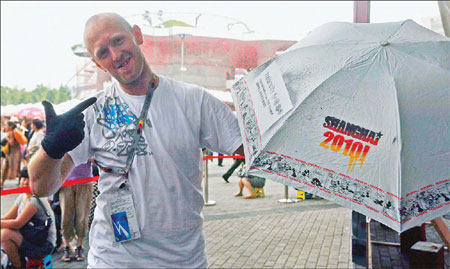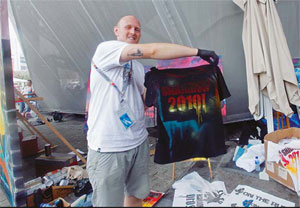|

A German graffiti artist shows his work on a T-shirt and an umbrella. Photos by Yong Kai/China Daily |
A series of hip-hop, beatbox, break-dance and graffiti events are being held, Yu Ran reports.
The Germany Pavilion is showcasing hip-hop music and graffiti as part of its urban youth culture celebrations at the Expo Garden during August. The event will include break-dancing contests and graffiti art displays.
The performances are organized by the Berlin Hip Hop Sttzpunkt, which is keen to support the development of hip-hop culture in China.
A series of hip-hop and graffiti events at the German Pavilion include a sketch corner for children, spray painting displays by graffiti artists, DJ performances, Oralic Sound Machines and freestyle rap. Visitors can request their own compositions to graffiti artists during the day and enjoy hip-hop performances in the evening.

"Hip-hop culture is considered the most successful youth culture of our times and it functions despite linguistic barriers and national borders. It's all about creativity, bringing people together and communicating," said Akim Walta, the project coordinator of the Shanghai 2010 Hip-hop Program.
Walta introduced a team of 50 artists from different cities in Germany, along with more than 50 Chinese and international performers.
The hip-hop phenomenon began in the late 1970s in New York's Bronx district. Breaking, better known as break dancing, which uses a piece of cardboard as a stage and the streets as a performance center, was also born in New York and spread across the world, including Germany. Graffiti art also has its origins in the city.
Beatbox, the fifth element of hip-hop culture, has experienced a boom recently in the form of "vocal percussion", which requires no drum machines, instruments or sampling. The rhythms are produced by voice and microphone.
Hip-hop is well established in Germany.
"The World Break Dance Battle of the Year, the largest graffiti art event and the Beatbox Battle World Championship have preliminary rounds held all over the world and draw over 20,000 young people to the finals in Germany every year," Walta said.
While Berlin's Hip Hop Sttzpunkt attempts to unite all hip-hop activities under one roof by offering artists a flexible artistic platform at a single location, hip-hop culture in the Chinese mainland is in early stages of development.
"It's quite difficult to enjoy hip-hop culture in a wild style like German people do. There are lots of fans of hip-hop culture in China, but few are really into the free hip-hop style," said Yang Zhiqi, 29, from Guangzhou, Guangdong province. "Hip-hop culture in China is mainly spread among underground bands and activities."
Yang said that as a hip-hop performer, he is worried about being isolated by mainstream culture as he adapts hip-hop as an essential part of his life.
Hip-hop music fans learned the original concept of free-style rap from video clips and songs from the United States, especially among African-American communities. As a primary ingredient in hip-hop music, rapping refers to an art form of spoken rhyming lyrics that expresses feelings in a straightforward, down-to-earth style.
"Normally we applied free-style rap to show our delight and ideas in simple phrases and catchy sentences by being positive, confident and full of personality," Yang said.
He said he prefers to communicate with others with hip-hop music as the spirit of hip-hop is to invite others to join in.
Graffiti, the form that covers everything from simple words and designs to elaborate wall paintings, is a popular counter-culture art form in Western countries, but is yet to be accepted nor recognized widely as an art style in China. But the trend of graffiti in China is developing slowly within limited networks and resources.
"The main problem we're facing is that we don't have any hip-hop or graffiti roots in China, so that we have failed to spread our spirit properly within the mainstream. We're trying to gather hip-hop lovers to continue the culture step by step," said Stan Wu, 27, from Hong Kong. Wu is the organizer of Wall Lords 2010, Asia's biggest graffiti event.
As part of the Berlin Hip Hop Sttzpunkt, the final of Wall Lords 2010 will take place at Jiangwan Stadium in Shanghai. "This will allow Asian graffiti community to interact and exchange ideas through competition," Wu said.
He said that everyone is invited to join the event.

